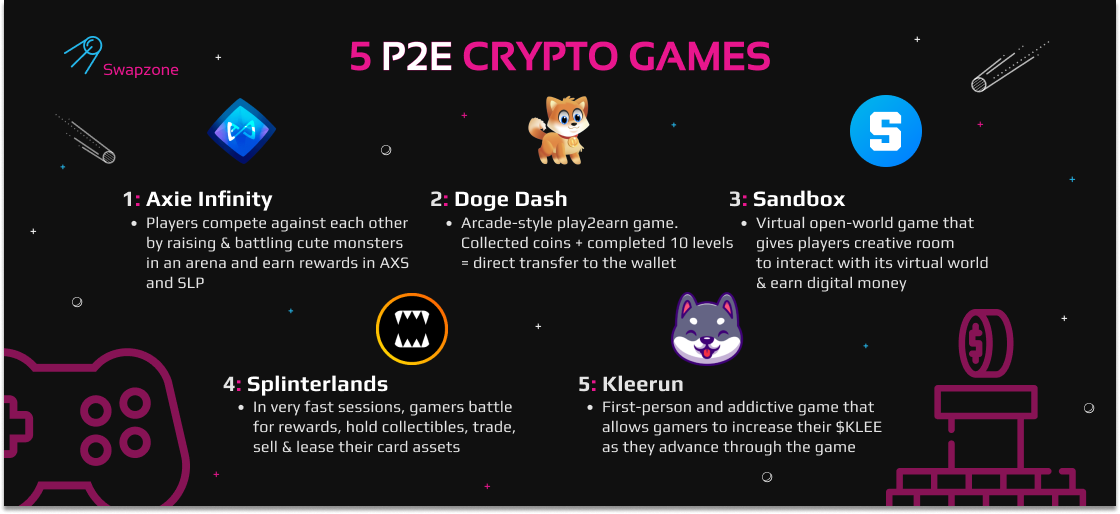Play to earn rewards: a easy way to turn gaming into a rewarding hobby
Play to earn rewards: a easy way to turn gaming into a rewarding hobby
Blog Article
Just How Play-to-Earn Benefits Are Transforming the Video Gaming Experience
The introduction of Play-to-Earn incentives marks a significant development in the gaming landscape, moving the focus from simple entertainment to real economic involvement. This transformation welcomes gamers to invest not just their time yet also their monetary resources, fostering a feeling of possession and deeper involvement within game ecological communities. As diverse demographics accept these opportunities, new areas emerge, blurring the lines in between leisure and investment. Yet, this change raises crucial inquiries about sustainability and the future of pc gaming. What implications could this have for the industry and its players?

Development of Video Gaming Versions
The landscape of gaming has gone through a substantial transformation over the decades, progressing from typical pay-to-play models to more ingenious structures that focus on customer involvement and money making. Initially, games were mainly offered as standalone items, needing ahead of time settlements for accessibility. This design, while efficient in producing profits, usually minimal gamer communication and area structure.

Recently, the increase of blockchain technology has introduced play-to-earn systems that essentially alter gaming characteristics. These designs not only provide a system for players to earn incentives however also equalize the video gaming economic climate, allowing customers to have in-game assets. This advancement shows a broader fad towards community-driven experiences, where developers and gamers collaborate in forming the video gaming landscape, ultimately redefining exactly how value is regarded in the gaming sector.
Benefits of Play-to-Earn Equipments
Unlocking brand-new opportunities for gamer interaction, play-to-earn systems offer a variety of benefits that essentially enhance the video gaming experience. These systems empower players by providing concrete incentives for their effort and time, cultivating a sense of possession and investment in the video game. This intrinsic inspiration drives gamers to engage even more deeply, exploring game technicians and communities that they may or else neglect.
In addition, play-to-earn models equalize pc gaming by leveling the playing field. Gamers from various backgrounds can maximize their skills and imagination, making it possible for brand-new entrants to experience monetary advantages that were commonly reserved for designers and authors. This change encourages a more diverse gamer base, improving the pc gaming community with different viewpoints and experiences.
Additionally, play-to-earn systems promote community building, as players collaborate and compete within decentralized settings. This communication grows social links that improve pleasure and retention, as players feel a sense of belonging.
Lastly, these systems can lead to increased longevity for video games, as constant gamer interaction commonly equates into sustained passion and financial investment in future versions or growths, guaranteeing a vivid video gaming landscape.
Economic Effect On Players
Play-to-earn systems not just improve gamer interaction but also have substantial economic implications for people entailed. These systems allow players to monetize their time and abilities, changing see this website video gaming from a pastime right into a practical income resource. As players gain copyright or in-game possessions that can be traded or sold in real-world markets, they obtain monetary incentives that can dramatically affect their personal economic situations.
The financial design fosters a new wave of entrepreneurship, as gamers can buy different gaming communities or create strategies to enhance their revenues. This possibility for earnings generation attracts a varied demographic, consisting of those in areas with restricted work chances - play to earn rewards. Several players are currently viewing video gaming not simply as entertainment however as a path to economic empowerment.
However, it is crucial to recognize the volatility connected with cryptocurrencies and the potential for market fluctuations to impact revenues. Players must navigate these dangers while stabilizing their gaming and financial activities. On the whole, the economic effect on helpful hints players is profound, reshaping their connection with pc gaming and opening up avenues for wealth development in an increasingly digital economic climate.
Area Structure in P2E Gamings

Players in P2E atmospheres often develop guilds or alliances, producing networks that facilitate resource sharing, tactical planning, and mutual support. These teams often engage in cooperative missions or competitors, additionally reinforcing their bonds and improving the general video gaming experience. Furthermore, community-driven events, such as tournaments and celebrations, serve to unify players, foster camaraderie, and incentivize participation.
In addition, programmers proactively engage with their communities, incorporating feedback and recommendations that shape video game advancement. This collective approach not just encourages players however likewise guarantees that games advance in placement with player interests, boosting contentment and lasting engagement. Ultimately, area structure in P2E video games is not simply a feature; it is a fundamental element that changes the video gaming landscape into an extra inclusive and interactive environment.
Future Patterns in Gaming
The video gaming sector's evolution is positioned to accept several transformative patterns that will redefine gamer engagement and experience. Among the most considerable trends is the combination of synthetic knowledge (AI) to create even more personalized video gaming environments. AI can examine gamer habits and choices, allowing designers to tailor experiences that resonate deeply with specific users.
Additionally, the advent of online and increased reality (VR/AR) innovations is established to enhance immersion, using gamers the ability to engage with electronic worlds in unmatched means. This will not only raise gameplay yet also foster social connections, as gamers can team up and compete in shared atmospheres.
In addition, the surge of blockchain technology will proceed to affect the pc gaming landscape, enabling true ownership of in-game possessions with non-fungible symbols (NFTs) This fad will certainly empower players to trade and monetize their video gaming experiences, additionally obscuring the lines in between pc gaming and financial investment.
Conclusion
In conclusion, the development of play-to-earn benefits symbolizes a crucial makeover within the gaming industry. By incorporating financial motivations right into gameplay, gamers are significantly involved, cultivating a feeling of possession and financial investment in electronic atmospheres. Furthermore, the democratization of video gaming assists in diverse involvement, promoting collaboration and community structure. As these fads proceed to progress, the obscured lines between home entertainment and investment will likely redefine the future of gaming, forming brand-new experiences for gamers worldwide.
Report this page